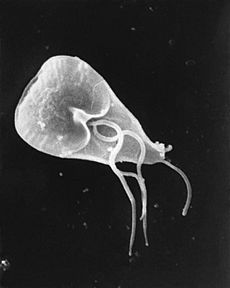Protozoa facts for kids
Protozoa are very small living things. They are made of just one cell, but they are not simple at all! These single-celled organisms are eukaryotes, which means their cells have a special center called a nucleus. Protozoa are also heterotrophs, meaning they get their food by eating other things, like bacteria or tiny bits of other food.
The word "protozoa" is an older term. Today, scientists often prefer to use the broader term "protist". However, "protozoa" is still used a lot, especially when learning about these creatures in school. It's a handy word to group many different kinds of tiny organisms together. Modern science, using biochemistry and genetics, shows that "protozoa" actually includes many different types of cells.
Contents
What Are Protozoa?
Protozoa are tiny organisms, usually too small to see without a microscope. They are single-celled, meaning their whole body is just one cell. Unlike plants, they cannot make their own food using sunlight. Instead, they must find and eat other things.
Where Do Protozoa Live?
You can find protozoa almost anywhere there is water or moisture. They live in oceans, lakes, ponds, and even in damp soil. Some protozoa live inside other living things, like animals or humans.
How Do Protozoa Get Food?
Protozoa are like tiny hunters. They eat different things depending on their type:
- Some are symbionts: They live with other organisms and sometimes help them.
- Some are parasites: They live inside another organism (called a host) and can cause harm or sickness. For example, Giardia lamblia (shown in the picture) is a parasite that can cause an illness called 'beaver fever'.
- Some are predators: They hunt and eat smaller things, like bacteria or tiny algae.
Scientists have discovered about 30,000 different kinds of protozoa. Each kind has its own unique way of living and finding food.
Related Organisms
- Protist: A wider group that includes protozoa, algae, and slime molds.
- Eukaryote: Any organism whose cells have a nucleus and other special parts.
- Amoeba: A type of protozoan known for changing its shape.
- Paramecium: A slipper-shaped protozoan covered in tiny hairs called cilia.
Images for kids
-
John Hogg's illustration of the Four Kingdoms of Nature, showing "Primigenal" as a greenish haze at the base of the Animals and Plants, 1860
-
Trophozoites of the amoebic dysentery pathogen Entamoeba histolytica with ingested human red blood cells (dark circles)
See also
 In Spanish: Protozoo para niños
In Spanish: Protozoo para niños
 | Victor J. Glover |
 | Yvonne Cagle |
 | Jeanette Epps |
 | Bernard A. Harris Jr. |







